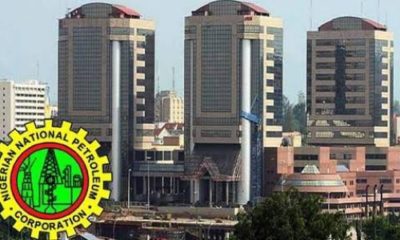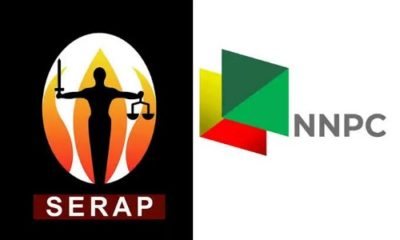Oil
NNPC recommends sale of refineries, Buhari disagrees

ABUJA-THE Nigerian National Petroleum Corporation has recommended the sale of the nation’s three refineries in Port Harcourt, Warri and Kaduna due to some challenges the agency described as critical elements, which may continually hinder their effective operation in the hands of the Federal Government.
NNPC has equally finalised its position on the protracted pipeline surveillance, with a verdict that the protection of the pipelines be entrusted to the military, which it believes can effectively protect the critical facilities.
A source in the corporation, who spoke to one of our correspondents on Saturday in Abuja, said the corporation’s stance was informed by the position of the NNPC Stock Reconciliation Committee, which met last week in Abuja to assess the performance of the refineries and associated logistics. The source, who is very close to the committee, explained that the committee concluded that the operation of the refineries could not be profitable under the current arrangements, which the panel described as unfavourable.
The source, who spoke on condition of anonymity, explained that the Ship-to-Ship transfer, which the corporation has employed to get crude oil to the refineries, cost between $6m and $7m per vessel and load one million metric tonnes of crude oil.
“MC COSMIC and MC JEWEL, which are engaged to transfer crude to Warri refinery because of their carrying capacities of about one million metric tonnes, collect between $12 and $14m per operation(trip). These are heavy vessels that load crude and transfer to smaller vessels. They then transport the crude to where the product can be transferred to the refineries.
“The same scenario is replayed to get the crude to the Port Harcourt refineries. If you add the amount to the already huge cost, you will realise that the nation cannot sustain the refineries on the prevailing conditions,” the source added.
The committee, it was learnt, also recommended the stoppage of the SWAP and the Offshore Processing Agreement (which had been carried out), in order to increase local availability of crude to the refineries.
“Crude business is done three months ahead. It was already concluded during the immediate past administration that the three refineries would be sold, even though the government had stocked all the materials for the turnaround maintenance of the refineries.
“So, there wouldn’t have been any crude for the local refineries if the SWAP deal and the OPA had not been cancelled; so, the quota that would have been exported was rescheduled to the three refineries,” our source said.
Disclosing that the Kaduna refinery started production from its Fractional Cracking Catalytic Unit at 11.50am on Saturday, the source, however, said the threat posed by pipeline vandalism remained the greatest challenge to the local refining of petroleum products.
“Kaduna refinery has the capacity to crack any type of crude from any part of the world, be it light or heavy. The FCCU, which produces all components of petroleum products from the crude supplied, started production at about 11.50 this morning. During the week, it was undergoing processing,” the source added.
“The fear of the committee, however, is that the number of leakages along the Warri-Kaduna pipeline will not allow the transfer of petroleum products to continue. In July, when the Kaduna refinery was about to start production, the pipeline had been breached in 78 points between Warri and Lokoja. The vandals have been able to identify the difference between the pipelines carrying crude, gas and refined petroleum product. And once there is a breach in one of the pipelines, other pipeline will be shut down.”
The source equally explained that the menace of vandals would also not allow fuel tankers to leave the nation’s highways soon, especially Lagos.
He said the NNPC had recommended to the Federal Government that the military should be directed to take over pipeline surveillance, as the agency would no longer be able to carry out the protection of the pipelines across the country.
“With about 250 points being attacked on a monthly basis, and the huge cost of putting them back in shape, there is no way the government can sustain such losses, which it had intended to stop,” he stated.
The source said owing to the challenges outlined by the committee, the panel believed the best operation for the government was to sell the refineries in their current state while holding on to a “minimal stake” in the facilities.
“The recommendation is that the government should sell the refineries as they are. The same principle applies to our cars; it gets to a point that we believe that they are no longer serving the purpose for acquiring them. The refineries have become a burden. It has been recommended that if the government will not embark on outright sale of the refineries, it should go into partnership but hold a minimal stake in the venture, especially with those who built the refineries initially,” the source added.
It was also gathered that the government had been advised to facilitate the setting up of modular refineries, which are smaller but runs on modern technology, to replace the existing facilities, which are even obsolete.
However, President Muhammadu Buhari is said to have disagreed with selling the refineries for now on the ground of what the source explained was based on “social and political” factors.
“You know the connection between the President and how he facilitated the setting up of the refineries in Port Harcourt. He is highly concerned about what the people will say. He is also said to be considering what the cost of petroleum products will be after the sales; considering what the government pays silently at the moment to make sure petroleum products are readily available,” the source said, while explaining that Buhari’s reaction had been made known to the top management of the NNPC.
Meanwhile, the NNPC has denied any plans to sell the country’s refineries at present.
According to the corporation, reforms by its new management have not suggested the sale of the three refineries located in Warri, Port Harcourt and Kaduna.
The corporation’s Group General Manager, Group Public Affairs Division, Mr. Ohi Alegbe, told our correspondent on Saturday that although the firm had undertaken series of reforms since its new management came onboard, it had not recommended the sale of the national refineries. Alegbe said, “There is nothing like that.”
When told that there are concerns that the NNPC might not be able to protect the pipelines and that the Federal Government should take over the surveillance of the facilities, the corporation’s spokesperson replied, “It is also not true.”
On the level of vandalism and how it affects the respective capacities and outputs of the refineries, Alegbe stated that the corporation had adopted various measures to check the menace of crude oil pipelines destruction.
Explaining how the corporation had been protecting the pipelines in the interim since the cancellation of various pipelines’ protection contracts, he said the NNPC had engaged security agents of different communities where the facilities run through.
Alegbe said, “Firstly, there was no contract with the OPC (Oodua Peoples Congress) please. We have the police, the military and we also engage with community-based groups. And it is not as if the pipelines were left unprotected. We have the military, the civil defense and the police, and some leaders of communities that are bordering some of these pipelines have been involved in the protection process.”
One of the latest reforms of the NNPC’s new management, which was carried out last week, was the trimming down of the off-takers for the lifting of Nigeria’s crude oil from 43 to 16.
-PUNCH-
Oil
NNPC Discovers Over 4,800 Illegal Pipeline Connections

The Nigerian National Petroleum Company (NNPC) Limited has revealed the detection of more than 4,800 unauthorized connections on oil pipelines within the country, painting a troubling image of the nation’s primary source of revenue.
Mele Kyari, the Group Chief Executive Officer of NNPC Ltd, communicated this information to the Senate Committee on Appropriations last Friday.
He said, “We have over 4,800 illegal connections on our pipelines. That means in some lines, within 100 kilometres of pipelines, you have as much as 300 insertions.
“Therefore, even when you produce the oil, you cannot deliver them at the required pressure and therefore the volume will also be less.”
As per the NNPC Ltd chief, individuals from various regions enter the Niger Delta, inserting unauthorized connections on pipelines in Nigeria’s oil-producing area.
This recent revelation follows a prior discovery of 295 illegal connections to the pipelines by the firm a year ago, underscoring the escalating issue of crude oil theft in Nigeria.
Two years earlier, Kyari had highlighted the country’s daily loss of 200,000 barrels of oil, amounting to $13 million due to theft and vandalism.
He further stated “We have two sets of losses, one coming from our products and the other coming from crude oil. In terms of crude losses, it is still going on. On the average, we are losing 200,000 barrels of crude every day.”
After the discovery, Nigeria’s security forces pledged to enhance security around the country’s pipelines.
To bolster this, the Federal Government granted a multi-billion naira pipelines surveillance contract to Tantita Security Services, headed by former militant leader Government Ekpemepulo, also known as Tompolo.
Despite facing criticism for this decision, Senator Heineken Lokpobiri, the Minister of State for Petroleum, remains convinced that it was the appropriate course of action.
In August, following a tour of oil facilities in the Niger Delta, Senator Heineken Lokpobiri expressed gratitude to Tantita, commissioned by NNPC Ltd, for their ongoing work.
He also hinted at plans for further extensive endeavors in the future.
In 2021, after extensive debate and delays, the Petroleum Industry Bill was finally passed to attract increased foreign investment into the oil sector through amendments to regulations, royalties, and taxes.
Oil
Dangote Refinery Set To Begin Fuel Production With First Crude Arrival

Nigeria’s colossal $19 billion Dangote Refinery, after encountering several setbacks, is on the verge of kickstarting fuel production.
This achievement is heralded by the arrival of the first crude shipment, transported by the OTIS tanker carrying 950,000 barrels of Nigeria’s Agbami crude.
S&P Global, citing industry sources and tanker tracking data on spglobal.com, reported the tanker’s departure on December 6, en route to Lekki, the nearest land port to Dangote’s offshore crude receiving terminal.
Scheduled to reach its destination around 8 PM on December 7, the arrival of this shipment signifies the commencement of crude supplies for the refinery’s operations.
Chartered by the state-owned Nigerian National Petroleum Company (NNPC), the Suezmax tanker is an emblem of the initial crude supply to Dangote’s cutting-edge refinery, as disclosed by a West African oil trader familiar with the matter in the S&P report.
Even though the refinery was officially completed in May, the absence of domestic crude feedstock had hindered oil product manufacturing.
To address this, the NNPC, holding a 20% stake in the refinery, struck an agreement to provide 6 million barrels of crude oil as feedstock to the Dangote refinery in December.
This move aims to jumpstart operations and overcome the previous impediments.
Agbami, operated by Chevron, holds a prominent position among Nigeria’s major deepwater developments, producing around 100,000 barrels per day in the central Niger Delta.
Known for its light sweet crude qualities, with a specific gravity of 47.9 API and a low sulfur content of 0.04%, Agbami produces substantial amounts of naphtha and kerosene.
NNPC has chartered additional shipments from different Nigerian offshore fields to the refinery, marking the start of a sequence of planned crude supplies for the month, as mentioned by the oil trader.
Located on the outskirts of Lagos, Nigeria’s commercial hub, the Dangote Refinery encountered repeated delays since its 2013 announcement, despite significant installation progress in 2019.
The refinery, designed to handle multiple crudes simultaneously, targets three Nigerian crude grades—Escravos, Bonny Light, and Forcados. When operating at full capacity, it aims to produce 327,000 barrels per day (b/d) of gasoline, 244,000 b/d of gasoil/diesel, 56,000 b/d of jet fuel/kerosene, and 290,000 metric tons per year of propane/LPG.
Dangote’s operations starting signify Nigeria’s hopes to lessen its reliance on gasoline imports, addressing the deficiencies of its existing refineries undergoing repairs. This shift is poised to reshape Nigeria’s oil industry, potentially leading to gasoline self-sufficiency by the 2040s.
Dangote officials anticipate an initial output of 370,000 barrels per day (b/d), emphasizing jet fuel and diesel production.
Industry analysts, however, project the refinery to reach its full operational capacity by mid-2025, although potential delays remain a looming concern.
Oil
NNPCL Sets Dec 2024 Terminal Date For Fuel Importation

The Nigerian National Petroleum Company Limited (NNPCL) has announced intentions to cease importing refined petroleum products by December 2024, anticipating full operational functionality for all national refineries by that time.
Group CEO, NNPC Ltd, Mele Kyari, shared this at a meeting with Speaker Tajudeen Abbas of the House of Representatives, who advocated for the privatisation of Nigeria’s refineries on Thursday.
Projections indicated the national oil firm’s revenue could climb to N4.5 trillion by the conclusion of 2023. Moreover, the rehabilitation of the Port Harcourt Refining Company, managed by NNPCL, was slated for completion by December of the current year.
Meanwhile, Oil marketers verified on Thursday that the Port Harcourt refinery is set for operations, potentially starting in January 2024. They emphasized that once operational, this refinery could notably reduce the prices of refined petroleum products.
During the meeting in Abuja, Kyari asserted Nigeria’s intention to cease importing refined petroleum products by 2024, envisioning the country’s emergence as a net exporter of these commodities within the same year.
He outlined the plans for launching operations at the Port Harcourt, Warri, and Kaduna refineries.
Kyari reiterated that all refineries would operate at full capacity, ultimately paving the way for Nigeria to transition into a net exporter of petroleum products by the conclusion of 2024.
He attributed the inactivity of Nigeria’s refineries over the years to the petroleum subsidy, emphasizing that the removal of this subsidy was drawing significant private-sector investments into the sector.
Kyari said “I can confirm to you that by the end of December this year, we will start the Port Harcourt refinery; early in the first quarter of 2024, we will start the Warri refinery and by the end of 2024, Kaduna refinery will come into operation.
“This is the commitment we are giving today and you can hold us accountable for this. In 2024, many of the initiatives including the rehabilitation of our refineries and also the efforts of small-scale refineries, and the upcoming Dangote refinery, will make Nigeria a net exporter of petroleum products in 2024.
“We will no longer be talking about fuel importation by the end of 2024. I am very optimistic that this will crystallise.
Kyari promised that by the conclusion of 2023, the government’s anticipated revenue from the company would reach N4.5 trillion, emphasizing NNPCL’s adherence to the Petroleum Industry Act and its commitment to delivering value to shareholders.
Recall that in October 2023, it was reported that Nigeria’s monthly spending on the importation of Premium Motor Spirit, known as petrol, had reached approximately N843 billion due to NNPCL’s cessation of oil swaps.
In July of this year, the Nigerian Midstream and Downstream Petroleum Regulatory Authority reported that during the post-deregulation period, spanning June 1 to June 28, 2023, the country’s total petrol consumption amounted to 1.36 billion litres, with an average daily consumption of 48.43 million litres.
The average ex-depot price of petrol, sourced solely from NNPCL as the importer, stands at about N580 per litre.
However, both NNPCL and oil marketers declared on Thursday that this substantial oil import expenditure would soon diminish.
They anticipated a drop once the Port Harcourt refinery commences production of refined petroleum products from January 2024, barring any unforeseen circumstances.





















